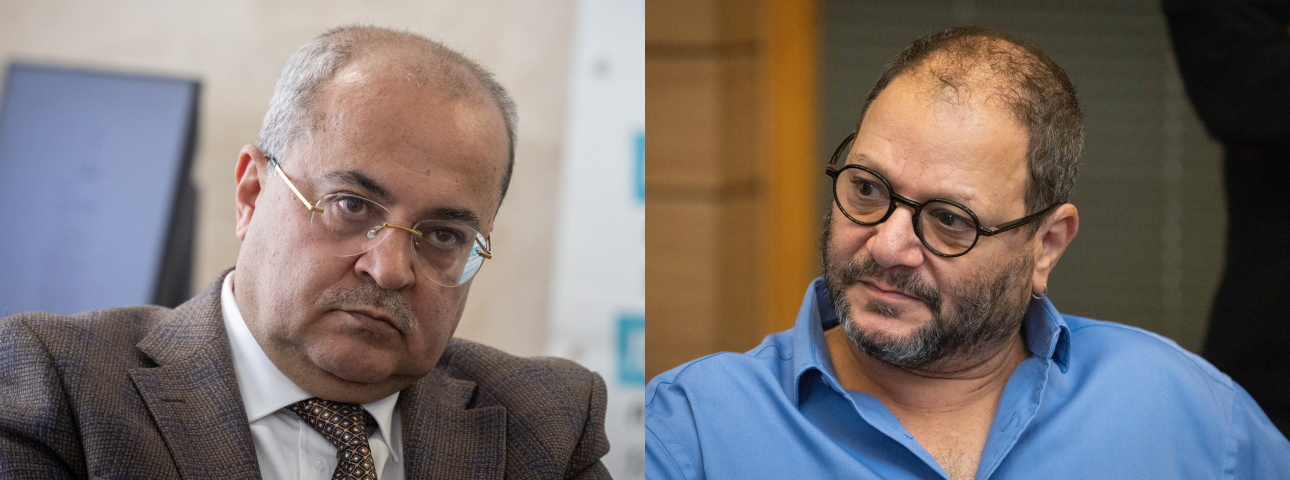Parliamentary Immunity: Explainer
After two MKs - Ofer Kasif and Ahmad Tibi - were allegedly involved in violence against police officers, IDI experts Dr. Amir Fuchs and Dr. Assaf Shapira explain the reasoning for and parameters of parliamentary immunity.

Left to right: MK Ahmad Tibi and MK Ofer Kasif| Flash 90
How far does Knesset members’ immunity go?
Knesset members enjoy parliamentary immunity in order to guarantee that they are free to carry out their duties without hindrance or fear, and to ensure their independence from the other branches of government.
MKs enjoy two types of immunity:
Procedural immunity protects MKs from standing trial while in office and relates to any offense for which they have been indicted. In the past, MKs enjoyed procedural immunity automatically: the Attorney General had to specifically request the Knesset to lift it when he deemed that appropriate. Since 2005, MKs do not have automatic procedural immunity, but they can request the Knesset to grant such immunity, on various grounds. This means that the default is no procedural immunity; instead, the Knesset must specifically vote to grant it.
Substantive immunity applies to actions that are directly related to the Knesset member’s official duties (“a vote, an oral or written expression of opinion, or an action, in or outside the Knesset, if the vote, expression of opinion, or action was part of his or her duty or was intended to enable fulfillment of that duty as a member of Knesset”). This applies chiefly to MKs’ freedom of speech, votes, and actions that are part of their job. Substantive immunity abolishes any criminal liability, does not expire when the MK returns to private life, and cannot be lifted. The courts have interpreted it to be applicable only within “the domain of the inherent risk” of MKs’ actions. Its goal is to permit MKs to speak, vote, and act freely in the fulfillment of their parliamentary duties, without fear that charges or lawsuits will be filed against them. It is not intended to allow MKs to commit deliberate criminal acts.
There are other categories of procedural immunity: immunity from searches and surveillance, subject to exceptions granted by a Supreme Court justice; and immunity from arrest, unless the MK “was caught in the act of committing a crime that involves the use of force, disturbance of the peace, or treason.”
MKs’ freedom of movement is also covered by the Immunity Law (“No provision that prohibits or limits access to any place in the country that is not private property shall apply to a member of the Knesset, unless that prohibition or limitation is on the grounds of state security or a military secret”).
What steps can be taken against Knesset members?
The rule of law requires that, subject to their substantive immunity (which, as stated, covers only actions in fulfillment of their parliamentary duties), MKs, too, be subject to the law. A criminal investigation of their actions can be opened (according to a directive issued by the Attorney General, the Attorney General must approve the opening of the investigation). The law specifies clear cases in which a Knesset member can be arrested (even without removal of his or her immunity): if he or she “was caught in the act of committing a crime that involves the use of force, disturbance of the peace, or treason”). Unless their request for immunity is granted, they can be indicted and stand trial.
When an MK is suspected of a serious crime, the police can request that a Supreme Court justice issue a surveillance or search order. When the need arises and following a decision by the House Committee, the Knesset can remove an MK’s immunity from arrest, searches, or surveillance, but it cannot lift his or her substantive immunity.
What measures can be taken if an MK strikes or injures an official agent of the state?
Whether the victim is an official agent of the state or a private citizen, on the face of it, it seems that violence by an MK is not protected by his or her substantive immunity (subject, of course, to the circumstances of the incident and questions of self-defense). Substantive immunity is not meant to protect violent behavior. When there is suspicion of a criminal act, the police can investigate an incident, and an indictment can be filed if warranted (again, subject to the circumstances of the case and denial of a request for procedural immunity).
Separate from criminal proceedings, inappropriate behavior by a Knesset member can be addressed by the Knesset Ethics Committee—but this committee has not been formed in the present Knesset because of disagreements between the coalition and the opposition. The Ethics Committee is essential for the Knesset’s proper functioning and for ensuring public trust in it. Without it, there is no way to prevent MKs from running amok. The failure to set up the committee contributes to the further deterioration of the level of debate in the Knesset and exacerbates the political crisis in which we are mired.
